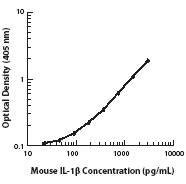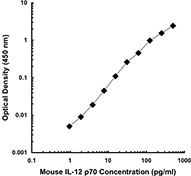- Regulatory Status
- RUO
- Other Names
- Cytotoxic T-lymphocyte-associated antigen 8, cytotoxic T-lymphocyte-associated serine esterase 8, Ctla8, Ctla-8, Il17a, Il17
- Ave. Rating
- Submit a Review
- Product Citations
- publications
IL-17A was initially identified from a subtracted cDNA library between closely related murine lymphoid cells and called CTLA-8. IL-17A shares 58% homology with an open reading frame of the T-lymphotropic Herpes virus Samirii virus (viral IL-17). IL-17A belongs to a family of cytokines, which has five members; designated IL-17A-F. IL-17 is expressed by a unique lineage of CD4 T cells, Th17 cells. This lineage selectively produces proinflammatory cytokines including IL-17, IL-17F, IL-21, and IL-22. In the mouse, the differentiation of this new lineage is initiated by TGFbeta-1 and IL-6 or IL-21, which activates Stat3 and induces the expression of the transcription factor retinoic acid-related orphan receptors (RORγt and RORα). IL-23, which also activates Stat3, serves to maintain Th17 cells lineage.
Product DetailsProduct Details
- Source
- Mouse IL-17A, amino acids Ala26-Ala158 (Accession # NM_010552) was expressed in E. coli.
- Formulation
- Lyophilized in sterile-filtered PBS, pH 7.2, containing 1% BSA, 0.09% sodium azide, and protease inhibitors.
- Concentration
- Lot-specific (to obtain lot-specific concentration and expiration, please enter the lot number in our Certificate of Analysis online tool.)
- Storage & Handling
- Unopened vials can be stored between 2°C and 8°C until the expiration date. Prior to use, reconstitute the lyophilized powder with 0.2 mL of PBS containing a carrier protein (e.g., 1% BSA, protease free), pH7.4. Re-cap vial, vortex. Allow the reconstituted standard to sit at room temperature for 15 minutes, vortex again to mix completely. The reconstituted standard stock solution can be aliquoted into polypropylene vials and stored at -70°C for up to one month. Do not re-use diluted standards. Avoid repeated freeze/thaw cycles.
- Application
-
ELISA
- Recommended Usage
-
Each lot of this protein is quality control tested by ELISA assay. For use as an ELISA standard, a standard curve comprised of doubling dilutions from 1,000 pg/ml to 7.8 pg/ml is suggested. It is recommended that the reagent be titrated for optimal performance for each application.
- Application Notes
-
This IL-17A protein is useful as a standard for a mouse IL-17A sandwich ELISA, using unlabeled TC11-18H10.1 antibody (Cat. No. 506901) for capture and biotinylated TC11-8H4 antibody (Cat. No. 507002) for detection.
-
Application References
(PubMed link indicates BioLegend citation) -
- Saha A, et al. 2012. Hum Mol Genet. 21:2233. PubMed.
- Product Citations
-
Antigen Details
- Structure
- Cytokine
- Distribution
-
IL-17A is largely produced by activated memory T lymphocytes, CD4+ T helper cells (Th17), neutrophils, CD8(+), NK, and gamma-delta T cells
- Function
- IL-17A is a potent regulator of granulopoiesis and neutrophil recruitment under normal and inflammatory conditions. Organ overexpression of IL-17A increases circulating neutrophil numbers and recruitment into the organs by induction of CXCL2, IL-1β, and G-CSF. IL-17A induces CXCL1, CXCL2, CXCL5, and CXCL8 in human epithelial cells. IL-17A also cooperates with TLR ligands, IL-1 beta, and TNF alpha to enhance inflammatory reactions and stimulate production of beta-defensins and other antimicrobial peptides. Th17 differentiation of human and murine naïve T cells is markedly suppressed in the presence of IFNα.
- Interaction
- IL-17AR is expressed in epithelial cells, fibroblasts, B and T lymphocytes, myelomonocytic cells, marrow stromal cells.
- Ligand/Receptor
- IL-17AR is expressed in epithelial cells, fibroblasts, B and T lymphocytes, myelomonocytic cells, marrow stromal cells.
- Bioactivity
- IL-17A signals through a heteromeric receptor composed of IL-17RA and IL-17RC.
- Biology Area
- Cell Biology, Immunology, Neuroinflammation, Neuroscience
- Molecular Family
- Cytokines/Chemokines
- Antigen References
-
1. Yu J, et al. Front Biosci 13:170-177 2008.
2. Toy D, et al. J. Immunol. 177:36-39 2006.
3. Benghiat FS, et al. Transplant Rev 23:11-18 2009.
4. Honorati MC, et al. Rheumatology 40:522-527 2001.
5. Rouvier E, et al. J. Immunol. 150:5445-5456 1993.
6. Liang SC, et al. J. Immunol. 179:7791-7799 2007.
7. Ouyang W, et al. Immunity 28:454-467 2008. - Gene ID
- 16171 View all products for this Gene ID
- UniProt
- View information about IL-17A on UniProt.org



















Follow Us